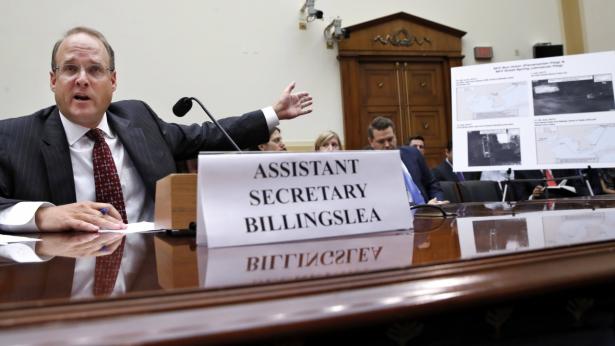Merida, October 31, 2018 (venezuelanalysis.com) – The US government has described Venezuela as a “clear threat to regional stability and security” this Tuesday. The remarks come as US-allied authorities in Bogota and Brasilia entertain military solutions to regional problems.
Speaking at the Washington based American Enterprise Institute, Assistant Secretary for Terrorist Financing of the US Treasury Department, Marshall Billingslea, stated that Caracas is “a direct challenge” to the US, and directly accused Venezuelan President Nicolas Maduro of money laundering.
“Venezuela poses a clear threat to regional stability and security on top of the horrific humanitarian crisis that is unfolding before our very eyes,” Billingslea said. “This is a hemispheric issue and the implosion of the regime there is a direct challenge for us,” he went on to say.
“We are on the hunt for Maduro and (his wife) Cilia Flores’ money and we are not going to stop until we find it,” he manifested. However, no evidence to back up these claims was provided.
The remarks come amid heightened tension between Caracas and Washington. President Trump recently backed potential military action against Venezuela, and his administration has been fostering support for “rebel” Venezuelan military officials in recent months, with an eye towards promoting a coup d’état against Maduro.
The US government also renewed the presidential decree 13692 in March this year, which classes Venezuela as an “unusual and extraordinary threat” to US national security, opening the way for financial sanctions and potentially other isolating measures against the Caribbean country.
At the time of writing, Caracas has issued no response to the US government’s remarks.
US allies flex military muscle
These latest claims from the US government come at a time of tense relations between Venezuela and its neighbouring US allies, Brazil and Colombia, with both Brazilian President-elect Jair Bolsonaro and Colombian President Ivan Duque rattling their sabres against Caracas this week.
Following the electoral success of Jair Bolsonaro in Brazil Sunday, President Trump was quick to promise “military” cooperation with the man described as a “neo-fascist,” with US State Secretary Mike Pompeo later offering “collaboration” in “priority affairs,” including efforts to overturn the democratically elected government in Venezuela, it has been reported.
Whilst on the campaign trail, Bolsonaro hinted numerous times at a possible military action against Venezuela, as well as allowing for a US military base to be established close to the Venezuelan border.
Speaking after his victory, and in reference to Venezuela and Cuba, Bolsonaro clarified his political orientation by stating that “We will stop praising murderous dictatorships, and we will stop scorning or even attacking important democracies like the USA, Israel and Italy.” He has since declared that his first foreign trips as president will be to the US and Israel.
In a separate interview, Bolsonaro appeared to tone down the rhetoric by saying that an intervention in Venezuela “is not in Brazil’s plans.” Nevertheless, he reiterated that Brazil would play a role in “solving this problem.”
On the same day Bolsonaro was declared victorious, fellow ultra rightist and US ally, Colombian President Ivan Duque, sent 5,000 troops towards the Venezuelan border Sunday.
Under the pretence of fighting “terrorists” and “organised groups”, the troops, who were sent to the Catatumbo region, will add their guns to the 6,000 border standing army and the additional 2,000 soldiers and policemen sent to the area in April, just before Venezuela’s presidential election in May.
The Catatumbo region, which is divided between Colombia and Venezuela, has been the site of intense struggle between the organised peasants and the Colombian state in recent years, while Bogota also claims that rebel groupings such as the ELN (National Liberation Army) operate in the area. The region, which sees some of the best organised farmers in Colombia, has seen protests and strikes in recent times, alongside claims of repression and persecution by both official and paramilitary security forces. It has also been the scene of several murders of community leaders by right wing paramilitary forces.
Venezuela closes border to prevent foot and mouth spread
Venezuela itself partly closed the Colombian border Tuesday, not in response to the military build up on the other side, but following an outbreak of foot and mouth disease in Colombia.
Following orders from Venezuela’s Productive Agriculture and Land Minister, Wilmar Castro Soteldo, all border movement of animals, animal products and sub products has been barred. The same applies to all existing imports of potential virus-carrying products from Colombia. Animals in the border region are to be vaccinated and vets have been deployed to guard against the spread of the disease.
Caracas also accused Colombia of failing in its WHO responsibilities as the virus returned after more than five years. Foot and mouth disease is an infectious virus that affects cloven-hoofed animals. While effects on humans are rare, the disease spreads very quickly among cattle.


Spread the word